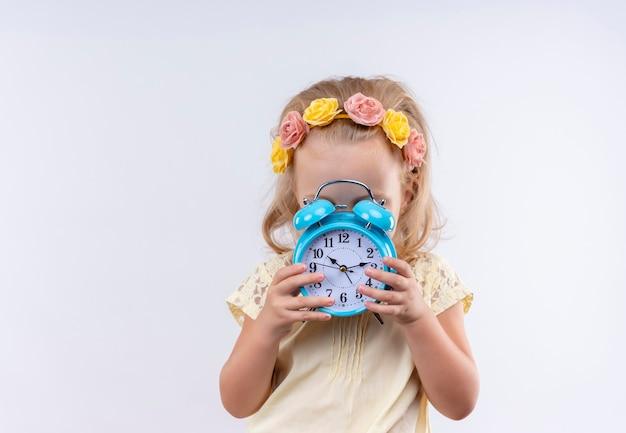To be honest, helping your little one learn how to manage their time feels like trying to get them to eat their vegetables. They’d rather chase butterflies, build block towers or play on an iPad than focus on schedules.
And who can blame them? Life is so much more exciting when you’re exploring and having fun!
But the truth is, daily routines aren’t just about keeping the chaos at bay, they are about setting kids up for a lifetime of responsibility, good habits, and success.
Here’s how you can help your little one in 4 key steps.
- Structure Builds Security: Start with Simple Steps
Ever feel like your preschooler’s day is a whirlwind of chaos with no clear direction?
You’re not alone. A lot of parents have been there, trying to get them dressed, fed, and out the door without a meltdown. But what if there was a simple solution to help your little one feel more secure and manage their day with ease?
Many parents are surprised to learn that preschoolers thrive on structure. A consistent daily routine, like those cozy morning greetings or circle time at daycare, helps children feel calm and confident because they know exactly what to expect. And the good news is, you can bring that same sense of order into your home.
Start small by introducing little, repeatable tasks that your child can easily follow, such as getting dressed before breakfast or tidying up toys before bed.
These simple steps don’t just teach kids how to stay organized, they also give them the tools to follow through with tasks, building a sense of accomplishment and routine that will last.
- Visual Aids Are Game-Changers
Have you ever tried explaining to your child that you are busy or overwhelmed , only to have them insist on “play with me”?
Explaining time to a preschooler can feel like speaking a different language. But what if you could help your little one understand time in a way that actually clicks for them?
Kids learn best when they can visualize things. That’s why many preschools use charts and timers to help kids understand time. You can easily bring this strategy into your home!
Create a morning routine chart with pictures for tasks like brushing their teeth, putting on shoes, and grabbing their backpack.
Watching the timer count down gives them a clear understanding of how time passes, making transitions smoother and helping them feel more in control of their day.
- Turn Tasks into Fun Games
Do you ever feel like managing your own daily tasks is already an uphill climb, and adding your child’s routine to the mix makes it even harder?
Getting them to clean up or finish their tasks might be the most challenging part of your day. But what if routines didn’t have to be a battle? What if they could actually become something your child looks forward to?
Preschools know the secret: turn tasks into games! Teachers often make transitions exciting by saying things like, “Let’s race to clean up the blocks before the timer beeps!” And guess what? You can do the same thing at home.
Why not try singing a fun “brush your teeth” song or play a “beat the clock” game to see how quickly you can put away toys? These little changes make routines feel less like chores and more like enjoyable challenges.
When kids associate routines with fun and happy moments, they’re more likely to stay engaged and even look forward to the next task! This can also foster a sense of healthy competitiveness, encouraging them to complete their activities efficiently while enjoying the process.
- Teach Responsibility with Small Jobs
Have you ever had your little one run to you with excitement, asking if they can help with something? It’s such a sweet moment, and it’s also a perfect opportunity to teach them valuable life skills!
For instance, imagine it’s time to feed your dog, and your child eagerly wants to help. You can let them pour the food into the bowl or make sure the water dish is full.
Just like preschools give kids small responsibilities, like setting the table or watering plants, you can involve your child in simple tasks at home like helping pack their lunch or organizing their shoes. It’s a great way to foster both independence and responsibility, all while making the process enjoyable!
How Petite School House Helps with Time Management Skills
At Petite School House, a trusted child care center in Northridge, we mix fun and structure to make daily routines enjoyable and educational. Our program uses creative, project-based learning to teach important life skills, including time management.
By choosing Petite School House, you’re giving your child the tools they need to thrive. Our preschool in Northridge, CA, uses engaging visual schedules and fun activities that help kids learn to prioritize, stay organized, and be independent.
If you’re seeking exceptional care and education in Northridge, Petite School House offers tailored programs designed to nurture every stage of your child’s growth and development. Whether you’re looking for:
- A child care center in Northridge for toddlers and twos that provides a safe and stimulating environment for your little one to explore, learn, and grow at their own pace.
- A day care center in Northridge with engaging programs for three-year-olds that fosters creativity and social skills through hands-on activities and structured routines, laying the groundwork for future success.
- Preschools in Northridge with advanced learning for preschool, kindergarten, and beyond that offers a curriculum that challenges young minds while encouraging exploration, critical thinking, and a love for learning.
Schedule a tour today and discover why families in Northridge trust us to help their children build bright futures!


